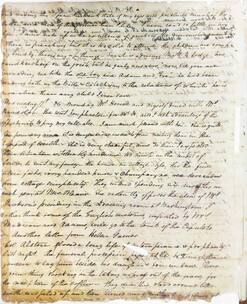
In 1819 Haynsworth married John Gayle, another South Carolinian who had moved west seeking new economic opportunities. She was fifteen years old. Her husband’s career as an ambitious young attorney led him upward in Alabama politics to become governor. The couple moved from Claiborne to Greensboro and then to Tuscaloosa as his political career progressed.
Hardly more than a child herself, Sarah quickly found herself the mother of baby after baby almost every other year. Her life revolved around her children while her husband was frequently absent for extended periods. An only child whose parents were deceased, she had no other family of her own in Alabama. Desperately lonely but foregoing self-pity, she dealt with her emotional needs herself. First, she built a network of women relatives and friends, especially among her husband’s cousins and siblings, and then in 1827 she began a journal that she maintained for nine years until her sudden death from lockjaw in 1835 at age thirty.
She described her opinions and thoughts, observed her neighbors’ good and bad behavior (and included their names), and worried about the effects of her husband’s absences on their children. Although her formal education was only elementary level, she possessed an enormous intellectual curiosity that she fed with voracious reading. She read the works expected of southerners (those of Sir Walter Scott and Washington Irving), but she also read theology, Restoration comedy, political speeches, educational treaties, poetry, drama, travel accounts, anti-slavery literature, ancient and contemporary history, and biography. Despite her limited education, the journal is well-written, demonstrating a maturity and insight beyond her years and education.
The diary of Sarah Gayle, wife of Gov. John Gayle, offers an intimate portrait of the life of a woman on the Southwest frontier.
When and why such damage occurred is uncertain. The journal remained with family members until the mid-twentieth century. Gradually, the family papers were transferred to the University of Alabama library, first only on loan and later by donation. Gayle family descendants were (and are) very protective of the reputations of each other, and probably the damage to the journal was done to stifle any comment that might reflect less than well on family members or an identified neighbor whose descendants still live in Greensboro or Tuscaloosa.
To protect the journal and enhance its availability to students of antebellum history, two historians, Sarah Woolfolk Wiggins (University of Alabama, emeritus) and Ruth Smith Truss (University of Montevallo), have accurately transcribed the text, restored the defaced passages, and edited the volume. The University of Alabama Press is publishing Sarah Gayle’s journal in its entirety. Because the unusual length of the journal would make the journal prohibitive to produce, subventions were necessary. The University of Alabama Libraries Leadership Board, the University of Alabama Libraries, and The Society of the Order of the Southern Cross have joined together to provide generous financial support to subsidize the cost of this publication.
Sarah Gayle’s journal is unique as a woman’s journal reflecting life in early nineteenth-century Alabama. Although many manuscript collections detail the lives and activities of her contemporaries, her journal stands alone as a personal window into the Alabama world of a young mother between 1827 and 1835. Archival collections contain no other account written by an Alabama woman in this period. This journal is not one for hasty reading. Rather, it is one that will slowly immerse the reader into the antebellum world of a sensitive, perceptive young woman almost suffocating from the life she led in Alabama in the Old Southwest.
This feature was previously published in Issue 110, Fall 2013.
ADDITIONAL MATERIAL
Read Sarah Woolkfolk Wiggins' full-length feature "Sarah Gayle and Violence in the Old Southwest," previously published in Issue 115, Winter 2015.
Author
Sarah Woolfolk Wiggins is a professor emerita of history at the University of Alabama and a past president of the Alabama Historical Association. She was the editor of the Alabama Review for twenty years. She is the author or editor of The Scalawag in Alabama Politics, 1865–1881 (University of Alabama Press, 1977); From Civil War to Civil Rights—Alabama 1860–1960: An Anthology from “The Alabama Review” (University of Alabama Press, 1987); The Journals of Josiah Gorgas, 1857–1878 (University of Alabama Press, 1995); Love and Duty: Amelia and Josiah Gorgas and Their Family (University of Alabama Press, 2005), and The Journal of Sarah Haynsworth Gayle, 1827–1835: A Substitute for Social Intercourse (University of Alabama Press, 2013).
 RSS Feed
RSS Feed